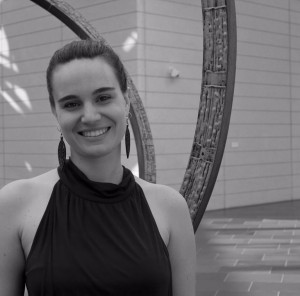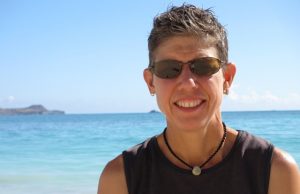Feminists We Love: Caitlin Breedlove & SONG
Southerners on New Ground (aka SONG) has been driving intersectional queer organizing in the South since 1993. Mobilizing across race, class, gender, citizenship status, sexuality , age, and ability, SONG employs a grassroots membership model and relational organizing to fortify queer communities towards the end of social justice.
Caitlin Breedlove has been a Co-Director of SONG since 2006. is a queer, white feminist with family roots in central and eastern Europe. Before joining SONG, she spent three years as the Intern Coordinator at the Highlander Center. She works collectively to push forward intersectional organizing, queer spirit building, and 21st century feminism.
HLT: Caitlin, tell me how you came to feminism? Queer politics? Organizing?
Caitlin Breedlove: I came to Feminism through the struggles of economic and gender oppression across an Ocean in the form of my mother’s migration to the US. I also came to Feminism as a queer spirit desiring bodily integrity and some bit of dignity. Finally, I came to Feminism as a woman moving with heavy gender restrictions, but also that wild loose energy that dykedom can give women lucky enough to be supported by queer elders who really nurture and care about if and how younger people grow. Organizing was put before me as a different life choice than anger alone, or lashing out without a plan. Organizing takes so much faith in the possibility of people together in all our messiness, drama, and profound, moving surprises of strength. I have always preferred organizing to cynicism or arm chair politics–sitting there and saying what everyone else is doing wrong but not jumping in. As for Queer politics–I am in it for the same reason I was 10 years ago–because I actually believe it is not overstated to say we are in a struggle for the Soul of the LGBTQ movement—to see if we are about Queer Liberation–which means the liberation of bodies and spirits from colonialisms of all kind–or if we are simply exchanging limited rights for more rights through the quiet but gruesome process of assimilation. LGBTQ people are so much more than a set of peoples who have to prove that we are like anyone else to ‘merit’ rights–we have fought too bravely for our lives on our terms to surrender that now.
HLT: What is SONG currently up to that you are particularly excited about?
Caitlin Breedlove: SONG stays edgy, messy, and expanding, so I stay constantly excited about what we do to be honest. I am so excited about the political directions we are taking around immigration, rural communities, and building 21st century BeLoved community by reducing hostile climates for LGBTQ, Black and Immigrant youth in Southern communities. So, in short, our media work and our organizing excites me. I am also so proud of our leadership. People around the country are often amazed that we have 100 member leaders, board and staff and that they are between the ages of 18 and 74 years old; majority people of Color; all LGBTQ; and so many of us immigrants. However, what is not always apparent is that even within we have 100 different stories and points of view–and that we struggle in a very principled way internally, with plenty of conflict, to move forward. “Diversity” in organizations is too weak a soup to get our leadership where it needs to be together. But, our struggles together go to the core, so the cords that connect us are filled with something pretty strong and robust. Is that liquid blood? Coffee? Wine? 🙂 You will have to ask someone else from SONG to answer that. But, I stay excited about the quality, fire and nuance of our leadership–and its sheer and growing numbers. In a time when base building (i.e. actually building the leadership of and connecting the people you work with and for) has gone out of fashion in a lot of social justice work, I love that we really are made up of LGBTQ people of Color, immigrants, rural and working class people.
HLT: SONG is explicitly, unapologetically, resoundingly a southern organization. Even social change efforts that take a deeply intersectional approach often leave region out. Can you explain why region matters, particularly when it comes to intersectional LGBTQ organizing?
Caitlin Breedlove: I am so glad you asked this! I think this is often misunderstood about SONG. Our location in the South is more than about our structure as a “Southern regional organization”; it is not just mission driven. It is also because this is our home. It is also a third thing. That is, that we choose to stay. We choose to stay in the part of the country etched with oppression and resiliency; the cradle of US slavery AND of the Civil Rights movement. We choose to stay in a place that is full of poor people–poor Black people, poor immigrants, and poor rural white people. That is a lot of who is this place. We also get less than 4% of national LGBTQ money, even though ⅓ of LGTBQ people in this country live in the South. We are the testing site of the Right wing, and so like all testing sites, there are visible and hidden landmines all around–homophobia, transphobia, racism. You know, a few years ago, we did a pretty large listening project with Southern Trans people. I will never forget what this one guy in Mississippi said. He said that he didn’t leave his house anymore at all because it was not safe to be trans and walk out his door. His femme partner did all their connecting to the outside world. He only even put his voice in that survey because it was online. As long as those are the conditions, how can SONG not fight? I have to say that our work in the South is about amplifying our resistance, but it is also about not giving up just because something is hard to do. So, often now we hear this organizing rhetoric about ‘strategic work’–which is important, but sometimes that thinking can just mask the fear we all have to be vulnerable enough to organize in hard terrain. SONG says we have to stay, and keep breathing life and energy into our lives and work til we expand so far we break the old shape of our existence. SONG Co-Director Paulina Helm-Hernandez calls this “shattering the right wing’s blueprint for the South.” Then we pick up our pieces and build a new one.
HLT: At SEWSA 2013, you and Kai Lumumba Barrow spoke to a room filled with mostly academics and did some calling out…with love. Specifically, you pointed to the ways academics study movements and even build careers on the backs of movements but do not sustain those movements financially or otherwise. TFW’s readership includes but is not limited to feminist academics and organizers. I wonder what ideas you have for fruitful collaborations between academics and justice movements.
Caitlin Breedlove: Another great question. There are many places. One place is in organizing. I have seen great work when academics build real relationships with movement leaders, get their students involved in campaigns, hold events to support organizing, and lend their research smarts to the cause. We also have to completely re-think how we talk about “financial support.” This is an extremely political question. Always, but right now, in a particular way. We know we are seeing the widest wealth gap in this country that we have seen since 1925 or so. We know that people in some parts of Asia are selling their kidneys to Americans out of sheer poverty. We have to stop being quiet, polite and awkward about money (for those of us who act that way)–and start modeling a deeper sense of inter-connectedness. As a middle class person, when I liberate $20 a month from my selfish plan for it (i.e. a new pair of jeans or 5 fancy coffee drinks) and put it toward MAJOR LOVE, a new fund that I support that supports Queer Legacyholder and Leader, Miss Major, to be able to retire and rest—I am helping myself. I feel that little piece inside me click into place because I have one moment of integrity–being who I say I am. So, I want to lovingly challenge academics, and all of us, to hold ourselves to that standard. To realize that re-distributing wealth into work we believe in is not an act of charity, tied up in non-profit systems, it is also an act of resistance to a dominant culture that encourages us to keep as much money for ourselves as possible, and that this will keep us safe. Well, in some ways it does, real talk, and in other ways we do this at our own peril–watching the ties of community that bind us through shared fate and shared resource just disappear.
HLT: SONG’s work is built on supporting whole selves, self determination, and connection. What are the everyday practices that allow people to bring their “whole selves” to the table? How do we built spaces that encourage “self determination”? How do we facilitate connection in our everyday lives?
Caitlin Breedlove: SONG has written a variety of tools on this subject, because, of course, there is no short answer. However, the degree of isolation in our culture at this point has to be overcome in order to build collective self-determination and wholeness of self. We believe that coming to agreement about how we work together and treat each other, and then taking risks together to confront power in alignment with an understanding of liberatory vision and current conditions can help us facilitate connection to purpose, ourselves and each other in everyday life.
HLT: One of the things that SONG does so beautifully is cultivating new leadership. As teachers, parents, aunties and uncles, mentors, and friends to younger folks, how do we energize and feed new visionaries?
Caitlin Breedlove: By listening to them, treating them with respect, bringing new leadership right into the center of the work AND not coddling or tokenizing them. People want to be the best they can be, new leaders are willing to earn their role. They do not want to be patronized by letting them do mediocre work and just hoping they stay. New leadership needs to be nurtured but also challenged. New visionaries need current leaders to see their potential and support them though asking them to work alongside the rest of us. This builds leaders who are brilliant and accountable–not just individual rockstars. In the 21st century we need feminist leadership that learns from our own individual experiences, but does not interpret ‘the personal is political’ to mean that our story alone, our suffering, is the center of our lives and our work. That is not too hard to do–we often feel a lot of compassion and proximity to our own story, or stories we see as like our own. What is harder–but so worth it– is to stay flexible, and expansive–to open our leadership and grow ourselves in order to understand and tackle questions of liberation in such a complicated time.
HLT: According to the vision and mission, “SONG is visionary, not reactionary. SONG organizes for hope, not in response to fear.” How do you stay hopeful?
Caitlin Breedlove: My spiritual life always keeps me earth-bound, habitual, and humorous (if I do say so myself). I keep myself in the daily habit of being a student of history–and always holding who came before in this particular work, and my spiritual and blood ancestors as well. I also keep myself close to my comrades–and keep tabs on the status of their hearts and lives. This helps me not become too isolated in my own story and questions–it is easy for me to go in my own head, so I have to keep in on-going soul level conversation with others. Not hard to do when surrounded with so much queer brilliance, and sass. I also read writing whose quality takes my breath away as much as I possibly can.





0 comments